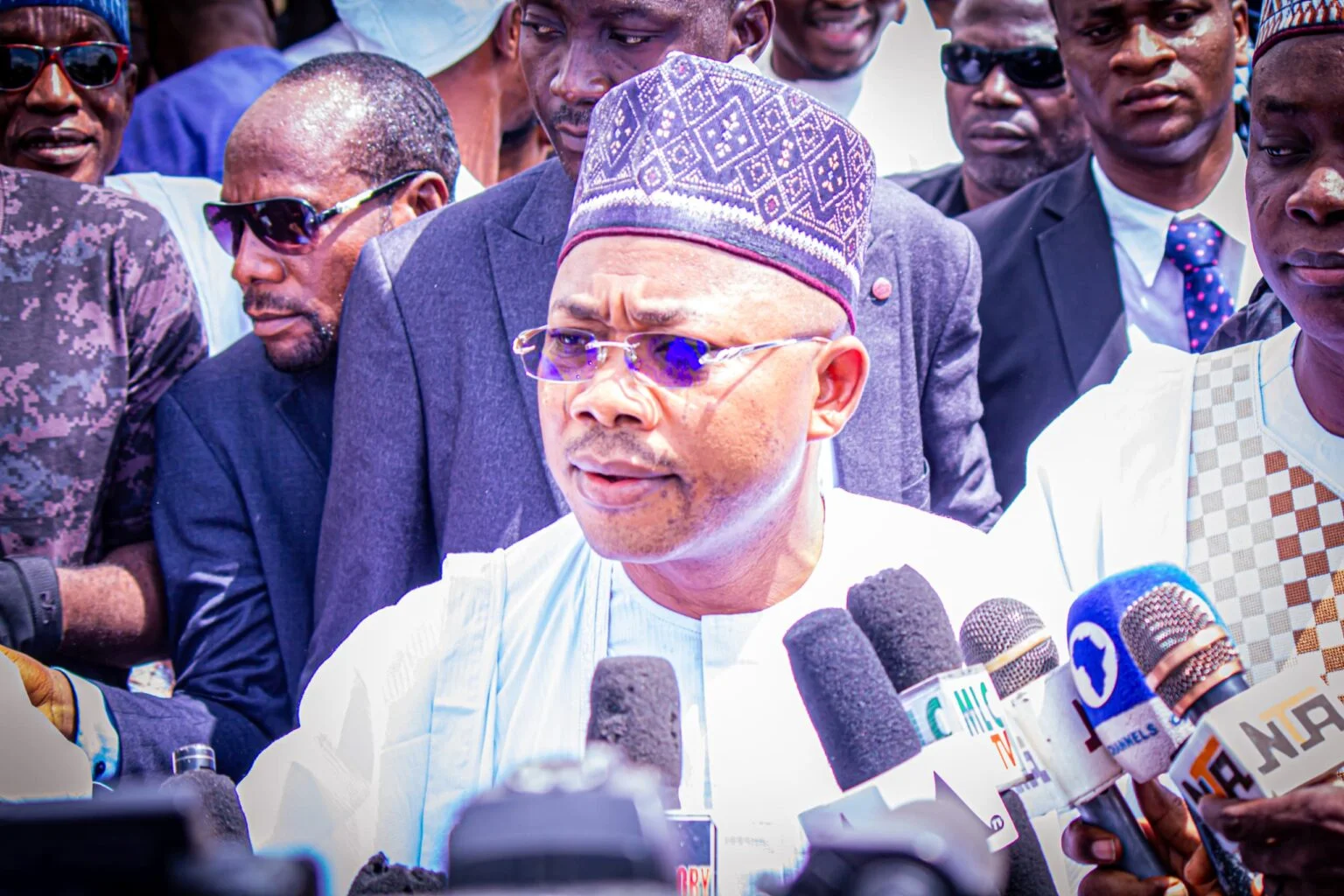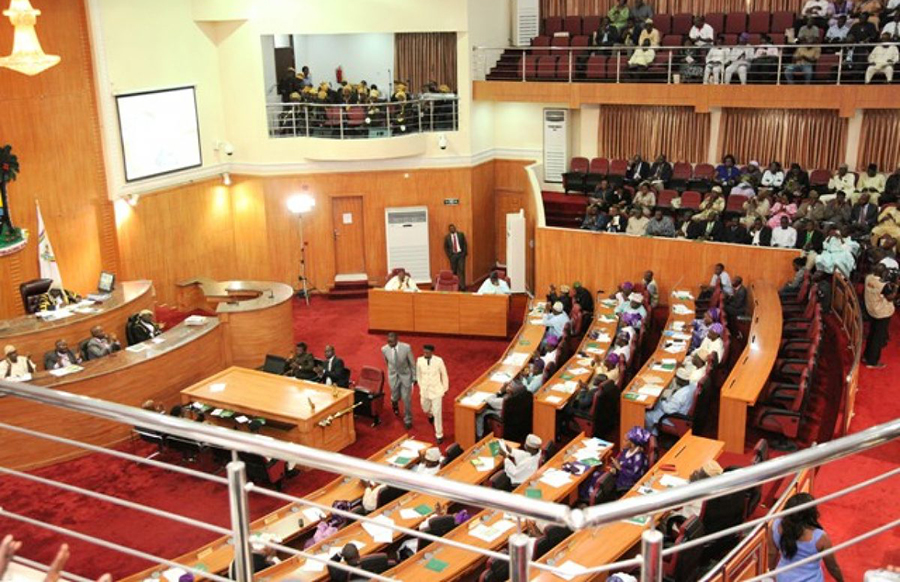Agriculture
Ortom Launches National Livestock Transformation Plan, Insists on Ranches

From Chris Gaga, Makurdi
Benue State government, Monday, launched the National Livestock Transformation Plan(NLTP)
A Stakeholders Steering Committee comprising of State Livestock Transformation Officers(SLTOs) and Project Management Officers have undergone a two – day training on the smooth implementation of the pilot scheme under the National Livestock Transformation Plan (NLTP).
The flag off was witnessed by the Senior Special Assistant to the President on Sustainable Development Goals(SDGs) and NEPAD, office of the Vice-President Mr.
Andrew Kwasari.Performing the flag off ceremony in Makurdi, Benue State governor, Samuel Ortom reiterated his stand that the NLTP will only be operated in line with the existing State law on Open Grazing Prohibition and Ranches Establishment Law 2017, adding that the law will take it’s course on offenders.
Ortom said his commitment and allegiance was with the people of Benue who voted massively for him, adding that the state had no land for other forms of animal husbandry except, ranching.
He said all ethnic groups including the Fulanis were welcome to Benue for livestock farming, but insisted that all who want to do livestock in the state must ranch.
“Other States are free to do Ruga, Grazing Reserves.They are also free to do cattle colonies, but here in Benue, it is ranching or no other thing.
The governor dared the National President of Miyetti Allah Kautal Hore, Abdullahi Bodejo for threatening to perpetrate attacks on states wanting to implement ranching instead of Ruga, to try grazing in the open in Benue and face possible arrest.
“Let it be known to the National President of Miyetti Allah Kautal Hore that, he cannot decide for Benue people. So Bodejo be careful! If you come here, you will not go free,” Ortom said.
Ortom expressed delight that the NLTP would benefit farmers and people of the state in their peculiar needs, even as he charged Benue people to take advantage of the plan.
He was confident that the six pillars of the NLTP if properly implemented would go along way in easing the pains of Benue people who have suffered much setbacks as a result of attacks.
He informed that as a matter of priority of the plan, he has obliged to Chair the steering committee with his deputy as alternate Chairman for smooth implementation of the project.
The governor appealed to the federal government to assist the persons who are still living in Internally Displaced Camps because of herdsmen attacks to return to their homes as promised by the Vice President.
The Senior Special Assistant to the President on SDGs/NEPAD, Mr. Andrew Kwasari charged Benue State government to craft it’s own strategy on implementing NLTP especially as they seemed it fit.
Kwasari also challenged the steering committee to understand the peculiar demands of communities affected and document them so as to “implement the plan in a Benue way inclusively.”
He said though it was not going to be easy to operate the policy, the SLTOs/PMOs should craft possible ways of ensuring an all inclusive implementation of the plan for the benefit of peace and harmonious coexistence.
The Special Adviser to the Benue State Governor on SDGs/NEPAD, Mrs Magdalene Dura, said the state was domesticating the NLTP within the ambit of the ranching establishment law of the state.
Speaking on behalf of the Tor-tiv, Tor Lobi, chief Moses Anagende and Och’Idoma represented by Ad’Otukpo, Chief Samuel Onuh expressed their confidence in NLTP saying it is best sutiable for the state.
The traditional rulers however maintained that any deviation from ranching as of the NLTP will be opposed with total vehemence, noting that RUGA and cattle colony stand rejected in the state.
Agriculture
NNPC Foundation Reiterates Commitment to Ensuring Food Security

The Nigerian National Petroleum Corporation (NNPC) Foundation has renewed its commitment to ensuring food security in the country.
Mrs Emmanuella Arukwe, Managing Director, NNPC Foundation, said this on Wednesday in her remarks during the training of vulnerable farmers in Akwa Ibom.
Arukwe said that 6, 000 farmers across the country would be trained on modern farming methods and market access strategies to boost food production in the country.
Arukwe, who was represented by Dr Bala David, Executive Director, Programme Development and Coordinator, NNPC Foundation, added that the Foundation was dedicated to implementing impactful programmes that aligned with national priorities.
She said that more than 500 farmers in Akwa Ibom were trained by the NNPC Ltd Agricultural Training Initiative for Vulnerable Farmers on modern methods and strategies to boost food production.
Arukwe added that the farmers were drawn from the state’s 31 local government areas to participate in the training to equip them with techniques and market access strategies to add value to their businesses.
“This programme is a testament to our unwavering commitment to food security, economic empowerment and national development.
“As the corporate social responsibility arm of NNPC Ltd, the Foundation is dedicated to implementing impactful programmes that align with national priorities.
“This initiative is part of our broader efforts to support the Federal Government’s agricultural transformation agenda, which seeks to enhance food security, increase productivity, and improve the livelihoods of smallholder farmers.
“Our goal is to equip every participant with the tools, knowledge, and resources needed to transition from subsistence farming to commercial-scale production,” Arukwe said.
In her remarks, Dr Offiong Offor, Commissioner for Agriculture and Rural Development, Akwa Ibom, thanked NNPC for the initiative to equip farmers with knowledge on modern farming.
Offor, represented by Dr Atim Okoko, Permanent Secretary, Ministry of Agriculture and Rural Development, said that a nation that trained farmers was a nation that would not go hungry.
“I want to express the state government’s appreciation to NNPC for mounting this laudable programme.
“A nation that starts to train farmers, a nation that starts to look at farmers will never go hungry.
“In this season that our President Bola Tinubu has come up with his Renewed Hope Agenda, everything is to end hunger in Nigeria,” Offor said.
The commissioner added that the programme came to complement what the state government was doing to ensure food sufficiency.
Responding on behalf of farmers, Mr Bassey Inwang, State Chairman, All Farmers Association of Nigeria (AFAN) said farmers in the state were so grateful for the training.
Inwang said the training would boost food production in the state, as the farmers would apply the knowledge gained on their farms for increase in yields.
He said, “We want to tell you that we will not take this training for granted, we will apply it properly on our farms.” (NAN)
Agriculture
FG Trains 120 Youths On Poultry Farming In Plateau

The Federal Government has commenced free six months training for 120 Plateau youths on poultry farming.
The training is through the National Youth Skills Acquisition Fund (NYESAF), under the Innovation, Development and Effectiveness in the Acquisition of Skills (IDEAS) Project.
Dr Daniel Jarafu, Chief Executive Officer (CEO) VetVille Nigeria Limited, one of federal government’s training service providers in charge of the training, said this on Saturday in Jos, at the flagoff of the programme.
Jarafu, said the project was a deliberate effort by the federal government to empower youths with skills that would make them skillful, self sufficient, employers of labour and in turn, boost economic growth of the nation.
According to him, the six months training is segmented into three months theoretical and three months practical aspects .
He further explained that at the end of the programme the trainees would sit for the National Skills Qualifications (NSQs) examination to earn a national certification which would be equivalent to certification earned in the formal education system.
Earlier, Prof. Arhyel Balami, the Guest of Honour, said the initiative by the federal government was highly laudable as it would lead to the empowerment of youths with hands on agricultural skills that would make them productive with sustainable livelihoods.
Balami, urged the trainees to make the best use of the training by being diligent, showing up and paying rapt attention during the course of the training.
The News Agency of Nigeria (NAN) reports that NYESAF is to train 75,000 youths nationwide, with the aim of enhancing job creation, entrepreneurship, and economic independence among young Nigerians.
NAN further reports that initiative underscores the government’s commitment to equipping youths with essential skills to drive economic growth and self-sufficiency
Agriculture
Food Security: Kogi Earmarks 30,000 Hectares Land For Farming

From Joseph Amedu, Lokoja
The Kogi government said it has set aside 30,000 hectares of land for farming activities in the state to boost food production.
Commissioner for Agriculture, Timothy Ojomah disclosed this in a chat with DAILY ASSET in Lokoja.
Ojomah said that the hectares of land would be allocated to farmers to ensure all year-round farming activities in the state.
He said the government had allocated 8,000 hectares in 2024, and decided to increase the size to 30,000 hectares to ensure massive food production and food security in the state.
The commissioner said: “the result of last year is obvious, given the records from the Bureau of Statistics.
“The prices of food items have reduced drastically in the state compared to what we experienced in 2024.
“Kogi stands at the bottom now in the ranking of states with high cost of food items.
“We used to be at the top in the ranking, however, the massive increase in food production is already changing the narrative.
“We are scaling up what we did last year and the farmers are already motivated by the intervention from government.
“We have already received more than 60,000 requests for the 30,000 hectares earmarked, which speaks about the enthusiasm and motivation of the farmers.
“More people are embracing farming in the state and looking forward to how the government can help them to improve food production.”
Ojomah also disclosed that the state government had birthed a special concept of Free Trade Zones and signed agreement with some group of Chinese companies and the World Bank to set up industries that could process its farm produce.
He also said that Gov. Ahmed Ododo recently approved a three months smart agriculture training for 50 youths from the state.
“When they return, they will equally train others to ensure that the state derived the desired benefits of the value chain in agriculture – processing, packaging, and exporting of our products.
“As we speak, arrangements are being concluded to expand the Omi Dam for production of 4,000 hectares of rice that can feed our rice mill (Alape Rice Mill), ” he said.
Ojomah, said the Gov. Ododo led government was partnering with Silvex International to set up a very large rice farm in the area.
“Silvex International is an experienced company in rice production, processing, and export.
“With the dam in the area, we are going to have full mechanised farming and all year-round rice farming,”he said.
The commissioner appreciated the governor’s foresight in developing the agricultural sector to enhance food production in the state.
“The governor has pledged that Kogi state will be vast in food production, ” he said






























